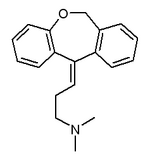Doxepin
Doxepin is a tricyclic antidepressant, known under many brand-names such as Aponal®, the original preparation by Boehringer-Ingelheim, now part of the Roche group; Adapine®, Sinquan® and Sinequan® (Pfizer Inc.); and Zonalon®, a cream-based preparation. more...
Pharmacology
Doxepin inhibits the reuptake of serotonin and noradrenaline from the synaptic cleft (dual action). The reuptake-inhibition of dopamine is very weak.
It has antagonistic effects (blockade) on a variety of postsynaptic receptors:
- Extremely strong : H1, H2
- Strong : 5-HT2, Alpha1, Muscarinic
- Moderate : 5-HT1
- Weak : D2, Alpha2
These effects account for the actions as well for most side-effects (sedation, hypotension, anticholinergic side-effects, massive weight gain). Doxepin shows strong antagonism against the effects of Reserpin (amine depletion) in the animal model. Like other 'classical' antidepressants it has a sodium channel blocking activity, possibly accounting for its analgesic action. Additionally, Doxepin exerts a strong local-anesthetic action.
Peak plasma levels are seen 2 to 3 hours after oral dosing.
Toxicology
acute toxicity:
- Mouse : i.v. 15 - 20mg/kg body weight, oral 148 - 178mg/kg body weight
- Rat : i.v. 13 - 19mg/kg body weight, oral 346 - 460mg/kg body weight
- Human : Not exactly known, clinical experience indicates a rather high acute toxicity, as is the case with other tri-/tetracyclics. Fatal dose in sensitive adults may be as low as 500 to 1,000mg oral (7 to 14mg/kg). In children below 12 yrs. of age any oral intake is to be considered as serious.
chronic toxicity
- Dog and Rat : Fat deposits in liver cells and decrease of triglyceride levels in plasma
- Human : Data not available
Indications
Approved uses may vary by country. In the United States, the only FDA approved use of doxepin is the treatment of depression. All other uses should be considered off-label.
- Depression
- Anxiety disorder, longterm-treatment is possible
- Insomnia, also suitable for longterm-treatment
- Alleviation of the symptoms of alcohol and drug withdrawal (N.B.: Doxepin does not suppress seizure activity in alcoholics ('rum fits'). Cotreatment with benzodiazepines or barbiturates is needed to treat seizures effectively.)
- Gastrointestinal ulceration and other GI-problems (e.g. irritable bowel syndrome), whether part of depression or not. The action is due to strong H2-receptor antagonism. The efficiacy is comparable to H2-Receptor-Inhibitors.
- Chronic pain, particular tension headaches, whether associated with depression or not
- External treatment of itching skin disease with Zonalon®
Contraindications
absolute :
- known hypersensitivity to doxepin or other dibenzoxepines or other ingredients of the drug
- acute intoxication with alcohol, sedatives, analgesics and other psychoactive drugs
- acute delirium tremens
- untreated closed angle glaucoma
- hypertrophy of the prostate with urine retention
- paralytic ileus
relative :
Read more at Wikipedia.org



